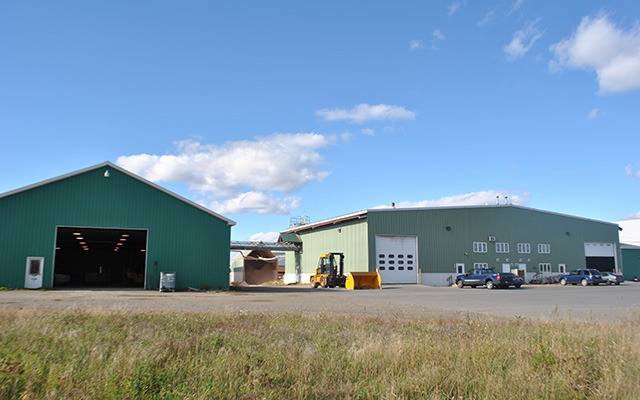
Well before the recent closures of the EcoShel and MooseWood Millworks mills, Ashland civic leaders were worried about the state of the area’s economy and started to do something about it.
“Arguably we’re ten years behind the curve, but we’re getting aggressive,” said Don Tardie, head of the Ashland area economic development committee and a retired mill and timberlands manager.
After a year of conversations with leaders from mills and forestry companies on the Route 11 corridor, Tardie said the committee is pursuing three interrelated goals: getting new businesses to co-locate with the ReEnergy biomass electricity plant at the industrial park, growing the local workforce and revitalizing Ashland’s downtown.
By co-locating, Tardie is referring to businesses that could partner with and locate next to the ReEnergy plant at the industrial park in order to take advantage of electricity costs at below grid prices as well as the biomass facility’s heat, steam or carbon dioxide.
ReEnergy already has similar arrangements with other mills at the Ashland industrial park and the company is now taking proposals for co-locating from interested businesses for its four Maine plants, in Ashland, Fort Fairfield, Livermore Falls and Stratton.
Tardie was pitching Ashland to ReEnergy executives during a recent open house at the company’s Fort Fairfield plant and said he thinks Ashland’s industrial park could host multiple manufacturing firms partnering with the biomass plant.
“Our industrial park is connected via private roads to 8 million acres of timberland. Ashland is as well positioned a plant as any ReEnergy may have.”
One of the challenges with attracting new businesses, though, is the region’s workforce shortage. While more than 6,000 Aroostook County residents work in the forestry sector, many are nearing retirement age and there are not enough new people entering the field, Tardie said.
“We’ve come to a critical juncture in terms of having enough workers. The sustainability of the operations are very much at risk because of the lack of a workforce.”
On that front, Tardie said Ashland is looking to for both more in-migration and home-grown workers interested in the forestry sector.
The town’s adult education program started offering the Maine Work Ready training class for people who are unemployed or seeking a job, including high schoolers. The Maibec lumber mill in Masardis also has started an internship program.
Mills and forestry companies are major taxpayers in Ashland and recent closures have underscored the importance of supporting them and attracting diverse businesses, said town manager Cyr Martin.
In June, the EcoShel cedar shingle plant closed after four years of operation, citing the impacts of the U.S. government’s tariffs on Canadian softwood products. In late August, heating pellet maker Northeast Pellets suffered a devastating fire at its factory (the second in its 11 year history). And in mid-October, the Seven Islands Land Company announced the end of operations for its hardwood floor maker, MooseWood Millworks.
While Northeast Pellets is vowing to reopen and Seven Islands is aiming to repurpose the MooseWood mill, to Ashland it feels like three businesses were lost, Martin said.
“Each of these business represents a big part of Ashland,” he said.
EcoShel closed before the town’s tax rate was set this year, and it already has had an impact, with Ashland’s mill rate increasing from $27 per $1,000 of property value to $28.25, the town manager said.
The Ashland Town Council formed the area economic development committee last year to take a proactive approach to working with area employers and attracting others, Martin said. With a federal grant and a $25,000 investment from the town, Ashland also is in the process of hiring its first economic development director.
“We want to broaden our horizons,” Martin said. “Our goal is to develop the industrial park as best we can.”
As Ashland leaders try to collaborate with employers, the community also has been improving its downtown village. With a $150,000 federal grant, Ashland has helped four local businesses renovate their buildings and helped demolish several other unoccupied buildings.
One of those formerly vacant downtown properties is now the site of a small farmstand. Malcolm Milligan, a 2016 Ashland high school graduate, purchased the parcel, tore down the building and built a small wood shed to sell his own home-grown produce on the honor system.
While there’s still a lot of uncertainty and risks in Maine’s overall forest economy, Ashland has good momentum and assets, said Yellow Breen, president of the Maine Development Foundation.
“Local efforts are crucial. The fact that there’s a team in Ashland working on this is good,” said Breen, who’s working on a multi-group effort crafting a long-term strategy for the state’s forest sector.
“You have 17 million acres of commercial timberlands in Maine. That asset is not going away,” Breen said. “We know there are innovative products you can make out of wood fiber.”







